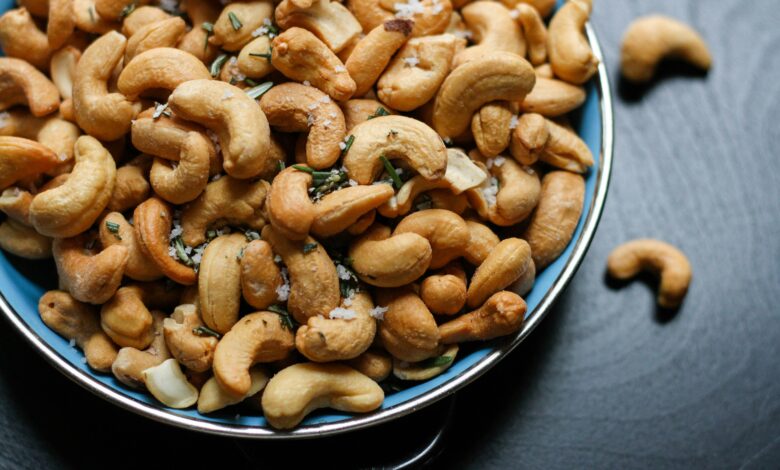Cashews vs. Other Nuts: Which One Is Better for Your Diet?

Nuts are often seen as a healthy snack choice. But not all nuts are created equal. Some have more protein. Others have more healthy fats. So when it comes to your daily diet, you might wonder — are cashews better than other nuts?
Let’s take a closer look at the nutritional value, health benefits, and pricing of cashews compared to other common nuts. By the end of this blog, you’ll know which nut deserves a spot in your pantry.
Nutritional Showdown: Cashews vs. Almonds, Walnuts, and Pistachios
When comparing nuts, nutrition is the first thing to examine. Each type of nut offers something unique.
Cashews are known for their creamy texture and slightly sweet flavor. One ounce of cashews contains about 157 calories, 5 grams of protein, and 12 grams of fat. Most of this fat is unsaturated, which is good for your heart.
Almonds have slightly more protein — around 6 grams per ounce — and fewer calories. They are also rich in vitamin E, an antioxidant that helps your skin.
Walnuts stand out for their omega-3 fatty acids. These fats are essential for brain health. A serving of walnuts has about 185 calories and 18 grams of fat.
Pistachios are a bit lighter. They offer around 159 calories per ounce and a higher amount of fiber compared to other nuts.
Cashews Price in Pakistan: How Do They Compare?
Price can be a major factor, especially if you snack on nuts regularly. Cashews, due to their rich texture and import costs, tend to be on the higher side. The Cashews Price in Pakistan can vary from PKR 2,200 to PKR 3,000 per kilogram, depending on quality and brand.
Compared to almonds and pistachios, cashews are often more expensive. Almonds typically cost around PKR 1,800 to PKR 2,500 per kilogram. Pistachios can range from PKR 2,000 to PKR 2,800. Walnuts are usually cheaper, especially if sourced locally.
Because of these price differences, many people wonder if the health benefits of cashews are worth the cost. In some cases, the Cashews Price in Pakistan reflects the nut’s versatility and nutritional richness. So, paying a bit more might be worth it for the benefits you get.
It’s smart to compare prices before you buy. Online marketplaces often offer discounts or bulk rates. Keep an eye out for seasonal deals to get the best Cashews Price in Pakistan.
Health Benefits of Cashews: What Makes Them Special?
Cashews are not just tasty. They come packed with health benefits that can support your body in many ways.
First, cashews are good for your heart. The monounsaturated fats they contain help lower bad cholesterol. This reduces your risk of heart disease. Also, they are a good source of magnesium, which supports nerve function and bone health.
Second, cashews contain antioxidants like polyphenols and carotenoids. These help fight inflammation and protect your body from oxidative damage. In the long run, this can reduce the risk of chronic diseases.
Moreover, cashews are lower in sugar than some other nuts. This makes them a good option for people watching their blood sugar levels.
However, it’s important to eat them in moderation. Like all nuts, cashews are calorie-dense. A handful a day is plenty to enjoy the benefits without going overboard.
Protein and Weight Management: Which Nut Wins?
If you are trying to manage your weight or build muscle, protein content matters.
Almonds and pistachios have slightly more protein than cashews. Almonds offer about 6 grams per ounce, while pistachios have around 6.5 grams. Cashews have 5 grams per ounce, which is still a good amount.
However, cashews are more filling due to their fat content and creamy texture. This can help you feel full longer, reducing your overall calorie intake.
Walnuts, on the other hand, have lower protein but more healthy fats. These fats can help you feel satisfied, but they may not be ideal if your goal is high protein intake.
In short, for pure protein, almonds and pistachios lead. For satiety and a balance of nutrients, cashews are still a great option.
Taste and Culinary Uses: Cashews Are Versatile
Another point in favor of cashews is their versatility. They blend easily into both sweet and savory dishes.
You can use cashews to make dairy-free milk, cheese, or cream sauces. Their mild flavor allows them to adapt to different recipes. They also make a great topping for salads or stir-fries.
Other nuts, like almonds, are great for baking or snacking. Walnuts shine in desserts and baked goods due to their rich flavor. Pistachios add color and crunch to both desserts and savory dishes.
But when it comes to flexibility in cooking, cashews are often the first choice for plant-based recipes. This adds value to their price and makes them a useful pantry staple.
Are Cashews Safe for Everyone?
For most people, cashews are safe and healthy. However, some individuals may be allergic to tree nuts, including cashews. Always check with your doctor if you have a known allergy.
Also, it’s best to eat unsalted, roasted cashews. Salted versions can be high in sodium, which might not be ideal for people with high blood pressure.
Lastly, raw cashews from nature are toxic due to a compound called urushiol. Thankfully, all store-bought cashews are steamed or roasted to remove this toxin.
In comparison, other nuts like almonds and walnuts also carry similar risks for allergy sufferers. So, always be cautious and read labels carefully.
Final Thoughts: Which Nut Is Best for Your Diet?
There’s no one-size-fits-all answer. Your ideal nut depends on your dietary needs, taste preferences, and budget.
Choose cashews if you want a creamy, versatile nut packed with healthy fats and essential minerals. Just be mindful of the Cashews Price in Pakistan if you’re shopping on a budget.
Go for almonds if you’re after more protein and vitamin E. Pick walnuts for brain-boosting omega-3s. Choose pistachios if you want more fiber and a lower calorie count.
Ultimately, including a variety of nuts in your diet is the best way to get a balance of nutrients. Rotate your nut choices, and enjoy each one in moderation.


